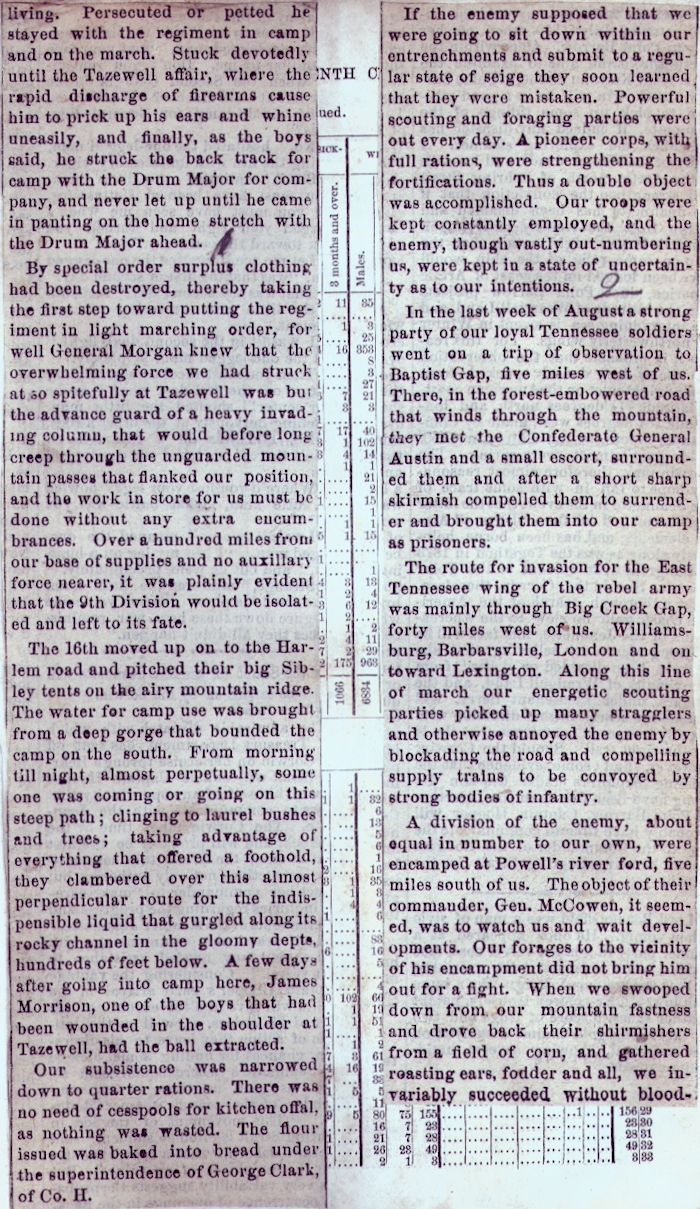| Camp & Field Page 30 | Camp & Field Index Page | 16th OVI Home Page | Camp & Field Page 32 |
The Camp & FieldArticles by Theodore Wolbach |
 Cpl. Theodore D. Wolbach |
The following image is taken from a book titled "Mortality and Statistics of the Census of 1850" in which it is believed retired Captain Rezin H. Vorhes, Company H, pasted over the pages a series of articles written by Cpl. Theodore D. Wolbach, Company E, titled "Camp and Field" and published, by chapter, in the Holmes County (Ohio) Republican newspaper from February 24, 1881 to August 17, 1882. The articles tell the story, in great detail and color, of the 16th OVI, from the inception of the 3-year regiment in October, 1861, through all its camps, battles and marches until it was disbanded on October 31, 1864. The articles pasted in the Vorhes book cover the first 35 chapters, published through October 20, 1881. All the remaining chapters were recently found in a Holmes County library by researcher Rob Garber who obtained copies, performed the transcriptions and provided to this website and which are also presented here, thus providing the complete work by Theodore Wolbach.
Throughout these articles click on the underlined white text for additional details.
The webauthor thanks 16th Ohio descendant Rob Garber for his excellent research on the Camp And Field articles and for performing the tedious digital transcription of those articles found on each page. The transcriptions were made to reflect the original articles verbatim, misspellings and all. Rob is the 3rd great nephew of Capt. William Buchanan, Company F, 16th Ohio, who served in the 90-day regiment as a private, re-enlisting in the three year regiment, and eventually making the rank of Captain of Company F. Thanks Rob!
Page 31 - Chapter 18 - August, 1862
 |
living. Persecuted or petted he stayed with the regiment in camp and on the march. Stuck devotedly until the Tazewell affair, where the rapid discharge of firearms cause him to prick up his ears and whine uneasily, and finally, as the boys said, he struck the back track for camp with the Drum Major for company, and never let up until he came in panting on the home stretch with the Drum Major ahead. By special order surplus clothing had been destroyed, thereby taking the first step toward putting the regiment in light marching order, for well General Morgan knew that the overwhelming force we had struck at so spitefully at Tazewell was but the advance guard of a heavy invading column, that would before long creep through the unguarded mountain passes that flanked our position, and the work in store for us must be done without any extra encumbrances. Over a hundred miles from our base of supplies and no auxiliary force nearer, it was plainly evident that the 9th Division would be isolated and left to its fate. The 16th moved up on to the Harlem road and pitched their big Sibley tents on the airy mountain ridge. The water for camp use was brought from a deep gorge that bounded the camp on the south. From morning till night, almost perpetually, some one was coming or going on this steep path; clinging to laurel bushes and trees; taking advantage of everything that offered a foothold, they clambered over this almost perpendicular route for the indispensible liquid that gurgled along its rocky channel in the gloomy dept[h]s, hundreds of feet below. A few days after going into camp here, James Morrison, one of the boys that had been wounded in the shoulder at Tazewell, had the ball extracted. Our subsistence was narrowed down to quarter rations. There was no need of cesspools for kitchen offal, as nothing was wasted. The flour issued was baked into bread under the superintendence of George Clark, of Co. H. |
If the enemy supposed that we were going to sit down within our entrenchments and submit to a regular state of siege they soon learned that they were mistaken. A pioneer corps, with full rations, were strengthening the fortifications. Thus a double object was accomplished. Our troops were kept constantly employed, and the enemy, though vastly out-numbering us, were kept in a state of uncertainty as to our intentions. In the last week of August a strong party of our loyal Tennessee soldiers went on a trip of observation to Baptist Gap, five miles west of us. There, in the forest-embowered road that winds through the mountain, they met the Confederate General Austin and a small escort, surrounded them and after a short sharp skirmish compelled them to surrender and brought them into our camp as prisoners. The route for invasion for the East Tennessee wing of the rebel army was mainly through Big Creek Gap, forty miles west of us. Williamsburg, Barbarsvile, London and on toward Lexington. Along this line of march our energetic scouting parties picked up many stragglers and otherwise annoyed the enemy by blockading the road and compelling supply trains to be convoyed by strong bodies of infantry. A division of the enemy, about equal in number to our own were encamped at Powell's river ford, five miles south of us. The object of their commander, Gen. McCowen, it seemed, was to watch us and wait developments. Our forages to the vicinity of his encampment did not bring him out for a fight. When we swooped down from our mountain fastness and drove back their skirmishers from a field of corn, and gathered roasting ears, fodder and all, we invariably succeeded without blood- |
| Camp & Field Page 30 | Camp & Field Index Page | 16th OVI Home Page | Camp & Field Page 32 |